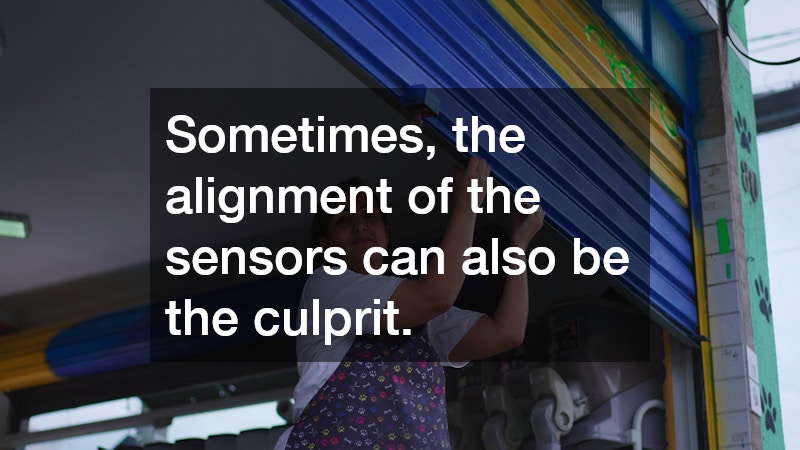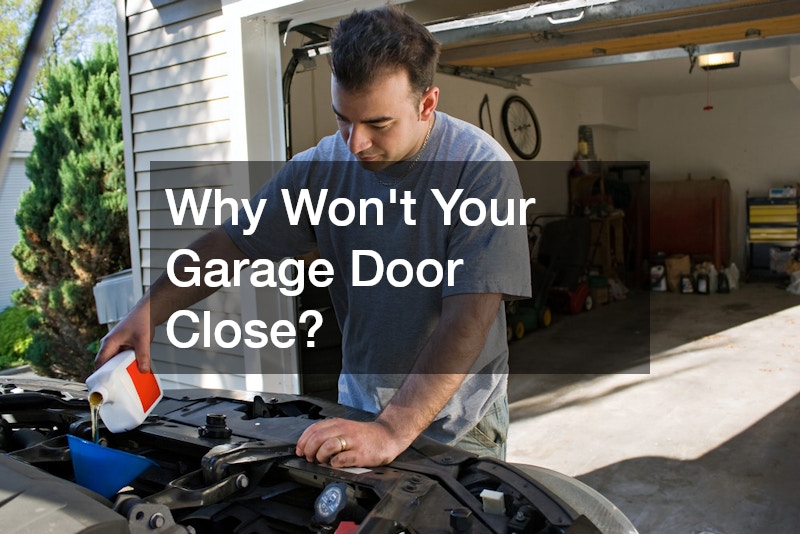One common reason why garage doors refuse to close is an issue with the sensors. These small but critical components are located near the bottom of the track on each side of the garage door. Their primary purpose is to prevent the door from closing on objects, people, or pets, which could potentially lead to injury or damage. When these sensors malfunction, it often leads to a situation where the garage door won’t close properly. In most cases, foreign debris or dirt can cause blockage, affecting the sensor’s ability to function as intended.
Sometimes, the alignment of the sensors can also be the culprit. If the sensors are not perfectly aligned with each other, the communication between them gets disrupted, effectively making the garage door believe that there is an obstruction in its path. This results in the door stopping halfway or reversing its path for safety reasons. Modern garage door systems are engineered to be responsive to potential faults in sensor alignment, but regular checks and garage door repair might still be necessary to ensure optimal performance.
Weather conditions can also play a part in sensor-related issues. Extreme temperatures, moisture, or condensation might cause sensors to malfunction. Furthermore, wiring issues can interrupt the power supply to the sensors, rendering them inactive. Regular maintenance and timely repair are essential in ensuring that your garage door’s sensors remain in good working order, eliminating a primary reason why your garage door won’t close as expected.
Mechanical Issues to Address
The mechanical aspects of a garage door are another possible culprit for its failure to close. The door’s tracks can become misaligned over time due to general wear and tear or a physical impact. When the tracks are not perfectly aligned, the rollers may have difficulty operating smoothly along their path, resulting in the door sticking or failing to close completely. This mechanical problem can often be resolved with regular inspections and swift garage door repair.
Springs play another vital role in the mechanical functioning of a garage door. Over time, springs can wear out, lose their tension, or sometimes break entirely, leaving the door unable to close. Given the high tension involved, attempting to repair or replace garage door springs yourself can be dangerous and is best left to the experts. By scheduling regular maintenance, you can ensure your springs are in proper working order, which can prevent unexpected issues from cropping up.
Lastly, the problem could be as simple as something physically obstructing the path of the door or its tracks. Items stored too close to the garage door tracks can sometimes shift and block the door’s path. Ensuring that the area around your garage door is clear can prevent such simple but often overlooked issues. Should you encounter any problems, calling a professional for garage door repair quickly can save you both time and further inconvenience.
Electrical and Remote-Controlled Issues
Electrical issues also rank high on the list of reasons why a garage door might not close. The connections between the door opener and sensors, or a problem with the power source itself, can lead to malfunctions. In some cases, the circuit board that controls the system may become defective and require repair or replacement. Regular testing of your garage door’s electrical components, as part of your home maintenance routine, can prevent such issues.
Another common problem arises from issues with remote-controlled systems. Batteries in remote controls and wall-mounted keypads eventually wear out, necessitating replacement. Issues with the frequency or code of the remote control could also interfere with its ability to communicate with the garage door opener. Proper synchronization and periodic testing can ensure remote controls are functioning as they should, minimizing disruptions.
Signal interference is another potential factor. Electronic devices and other components that operate on similar frequencies can disrupt the signaling between the remote control and door opener. Ensuring that remotes and keypads have fresh batteries and that there are no known interference issues can avert potential problems. If electrical and remote-controlled issues persist, reaching out for garage door repair is a wise course of action to diagnose and rectify underlying problems.
When to Seek Professional Garage Door Repair
While some garage door issues can be resolved through simple DIY measures, others necessitate the expertise of a professional. Mechanical failures, particularly related to springs or track alignment, can pose safety risks if not handled correctly. Seeking professional garage door repair guarantees that the repairs are conducted safely and efficiently, mitigating potential hazards that a DIY approach might overlook.
In addition to mechanical fixes, professional technicians are well-equipped to diagnose and address electrical and sensor-related issues. Thanks to their expertise, they can often pinpoint the problem much quicker than an untrained individual, saving you both time and frustration. They can also provide routine maintenance checks to prevent future issues from arising, which is a cost-effective and proactive approach to managing your garage door’s health.
Timely intervention from a professional garage door repair service can prolong the lifespan of your garage door system. The early identification of problems and immediate corrective measures can avert more significant issues down the road. Whether it’s a stubborn door refusing to close or preventive care, enlisting the help of experienced professionals keeps your garage door operating smoothly and reliably.



